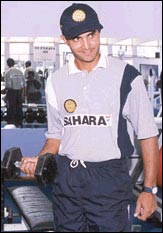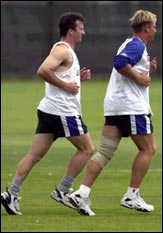
Show me the science
Dr Nitin Chhoda
Here's some 'food' for thought...
You get stronger when you rest, and when you feed your body, not when you train in the gymnasium. In fact, training by itself is just a 'stimulus' for the body to get stronger; whilst food and sleep are the 'fuel' to make the body run better.
How is this relevant from the point of view of supplements?? Consumption of carbohydrates, specific proteins, and other supplements during and after exercise can "bridge the gap" between potentially excessive athletic training and exceptional athletic performance.
The latest sports nutrition research now shows us how to achieve this goal. From an athlete's viewpoint, supplements can help from 4 angles -
1. THE POST WORKOUT MEAL.
Research reviews have determined that the hormone insulin halts protein
breakdown, but does little to stimulate increases in protein synthesis
rates.(1) Insulin research also demonstrates an abundant supply of amino
acids must be present along with high insulin levels to produce net gains in
 muscle. (2). In fact, the whole stimulatory effect of insulin on muscle
anabolism is dependant on a large, plentiful amount of amino acids to
stimulate protein synthesis rates that create increases in muscle (3) This
means a rapid, easily assimilated source of amino acids must be there at
precisely this time (post-workout). The reason - Repair of damaged muscle
proteins begins immediately after exercise.
muscle. (2). In fact, the whole stimulatory effect of insulin on muscle
anabolism is dependant on a large, plentiful amount of amino acids to
stimulate protein synthesis rates that create increases in muscle (3) This
means a rapid, easily assimilated source of amino acids must be there at
precisely this time (post-workout). The reason - Repair of damaged muscle
proteins begins immediately after exercise.
(A quick note on proteins and amino acids - just like different combinations of alphabets make up certain words, various amino acid combinations in protein foods - such as eggs, chicken, fish, protein powders get reassembled within the body to make muscles, cartilage, skin, nails, and even hormines - so proteins are vital)
The question arises - why should athletes who undergo heavy physical training take extra protein ?
Answer - To help offset tissue damage. During hard exercise your body uses certain amino acids such as isoleucine, leucine, and valine (the branched-chain amino acids) for energy. These make up one-third of muscle protein, and are also involved in the body's response to stress and the building of muscle. Sufficient amounts of branched-chain amino acids are found in any quality whey protein powdered supplement (generally imported brands - some are better than others ).
THE ROLE OF THE 'KING OF ALL AMINO ACIDS' GLUTAMINE.
While high muscle glutamine concentrations are absolutely vital for muscle growth and preservation, research continues to demonstrate an immense inability of the body to achieve and maintain these high concentrations, especially during intense training programs. (3) (4)
Glutamine may be the most important amino acid in the recovery process. Glutamine stimulates muscle protein synthesis and preserves skeletal muscle mass. There is good evidence that supplementing the diet with additional amounts of glutamine can enhance muscle performance.
Lastly, high intensity exercise has a severe impact on the immune system and repeated sessions lower plasma glutamate and glutamine levels. This leads to a negative impact on immune and organ function. Extreme results are chronic over training syndrome, chronic fatigue syndrome, and muscle loss. (5)
THE ROLE OF CREATINE MONOHYDRATE.
Creatine, also known as 'methylguanido-acetic acid' is formed in the liver from the amino acids arginine, methionine, and glycine. Creatine monohydrate, the supplement form of creatine, is a white, flavorless, odorless, and crystalline powder, clear and colorless in solution. Creatine can improve performance in intermittent 'bursts' of activity such as sprinting and weight training.
Currently any governing body in sports does not ban creatine, but there is debate as to whether creatine supplementation should be considered doping. It could be argued that consuming any substance in abnormal quantities with the intent of artificially enhancing performance is in violation of the International Olympic Committee's anti-doping legislation and should be considered doping.
 Although creatine supplementation may be ergogenic in a controlled
laboratory setting or in the weight room, how this translates into sports
performance on the field is largely unknown. Because creatine
supplementation can increase body mass, athletes involved in sports such as
football or weightlifting may benefit. However, this increase in body mass
may hamper performance in sports such as soccer, basketball, or swimming,
which may be adversely affected by the rapid weight gain associated with
creatine. Furthermore, not everyone benefits from creatine supplementation.
Although creatine may increase muscle levels of phosphocreatine and
laboratory studies show positive effects, success in sports is not
exclusively determined by substrate availability or enhanced energy
production. Numerous factors including skill, teamwork, coordination, and
luck can make the difference between winning and losing
Although creatine supplementation may be ergogenic in a controlled
laboratory setting or in the weight room, how this translates into sports
performance on the field is largely unknown. Because creatine
supplementation can increase body mass, athletes involved in sports such as
football or weightlifting may benefit. However, this increase in body mass
may hamper performance in sports such as soccer, basketball, or swimming,
which may be adversely affected by the rapid weight gain associated with
creatine. Furthermore, not everyone benefits from creatine supplementation.
Although creatine may increase muscle levels of phosphocreatine and
laboratory studies show positive effects, success in sports is not
exclusively determined by substrate availability or enhanced energy
production. Numerous factors including skill, teamwork, coordination, and
luck can make the difference between winning and losing
Overall short-term, medium-term, and long-term oral creatine supplementation does not induce detrimental effects on the kidney in healthy individuals, according to recent studies. (6) (7)
2. REPLENISH GLYCOGEN STORES AFTER EXERCISE.
When you eat carbohydrates after a workout, your body releases the hormone - insulin, as previously mentioned. In addition to its vital role in glycogen replenishment, insulin:
Stimulates the transport of amino acids into the muscle. By increasing the
cell's amino acid levels insulin speeds the protein rebuilding process.
 Blunts the rise in cortisol following exercise. Cortisol is the hormone
responsible for protein breakdown. By decreasing cortisol levels, insulin
helps maintain muscle protein.
Blunts the rise in cortisol following exercise. Cortisol is the hormone
responsible for protein breakdown. By decreasing cortisol levels, insulin
helps maintain muscle protein.
A carbohydrate supplement composed of glucose, honey, raisins, or a sports drink is more rapidly transported into the muscle cell in the critical post exercise period.
Since enzymes responsible for manufacture of muscle glycogen are maximally stimulated 0-2 hours after exercise, a carbohydrate supplement must be taken in this time frame to optimize recovery.
This is not always easy. Intense workouts decrease appetite, which is why a sports drink may offer an advantage. It helps in rehydration can easily deliver the proper nutrition to speed recovery and players find it easy to take.
3. REDUCE THE IMPACE OF FREE RADICALS ON MUSCLES
On a moment-to-moment basis, two formidable forces are at combat in our bodies. The first group includes renegade oxygen molecules called oxidants (free radicals) and this group is countered by the bodies 'police force' known as anti-oxidants. Destructive free radicals act like molecular gangs that roam our body mugging cells, ripping their membranes, and leaving the cells to die. The actual process is so slow and subtle, gradual and internally painless that it occurs over many years in incessant microsecond bursts of destruction.
The fact is, you won't notice it until the cumulative damage gives rise to what we call the symptoms of disease.
Exercise and stress results in the release of more free radicals within each and every cell in the human body.
Antioxidants such as Vitamin C and E have been shown to reduce free radical buildup during exercise and protect against muscle damage.
4. RESTORE ELECTROLYTES AND WATER
Maintaining cardiac output and regulating body temperature during exercise is accomplished by fluid and electrolyte replenishment.
Studies have shown that fluid replacement must occur both during and after exercise.
Now, unless you want to be connected to an IV drip while you are playing your sport, or whilst you are training in the gym. Use a sports hydration drink. These can accelerate re-hydration by speeding intestinal reabsorption of fluids and improving fluid retention. The key electrolytes are sodium, potassium, and magnesium. Since the normal thirst mechanism is usually not sufficient to restore fluid and electrolyte balance, players are generally encouraged by coaches to drink fluids containing electrolytes throughout and after a practice or game. (This is the practice of fielders sipping drinks at the boundary line in cricket.)
So do any of these sound like an 'illegal method' to you ? Well, to me, these sound like an intelligent and scientific ways to improve the results of all the hard work you put into the gym and on the field. So make that intelligent decision and you just might find an effective supplement for you with the aid of a good qualified trainer or dietician.
It could be the choice of a lifetime.
Bibliography:
1. Grizard J et al. Insulin action on skeletal muscle protein metabolism
during catabolic states.Reprod.Nutr.Dev.1999;39:61-74.
2. Zhang X, Chinkes DL, Wolf S,E and Wolfe RR. Insulin but not growth
hormone stimulates protein anabolism in skin wound and muscle.
Am.J.Physiol.1999.276;39:E712-E720.
3. Robson PJ, Blannin AK, Walsh NP, et al. Effect of exercise intensity and
duration on plasma glutamine response following exercise and the time course
recovery in physically active men. [abstract] J.Physiol. 1998;506:118P-9P.
4. Nurjhan N,Bucci A, Perriello G, et al. Glutamine: a major gluconeogenic
precursor and vehicle for interorgan carbon transport in man. J.Clin.Invest.
1995;95:272-7
5. Walsh NP, et al. Exercise and immune function: links and possible
mechanisms. Sports Med 1998:26(3):177.
6. Poortmans JR, Auquier H, Renaut V, Durussel A, Saugy M, Brisson GR.
Effect of short-term creatine supplementation on renal responses in men. Eur
J Appl Physiol. 1997;76:566-567
7. Poortmans JR, Francaux M. Long-term oral creatine supplementation does
not impair renal function in healthy athletes. Med Sci Sports Exerc.
1999;31:1108-1110.
Part I: Use Science, not steroids to be a Superman
Dr Chhoda is a sports medicine specialist